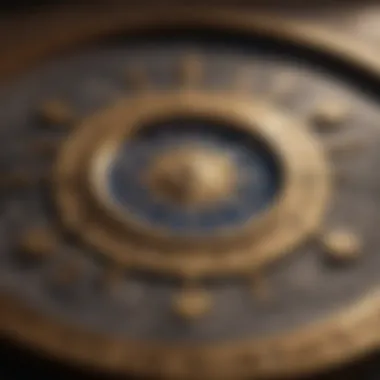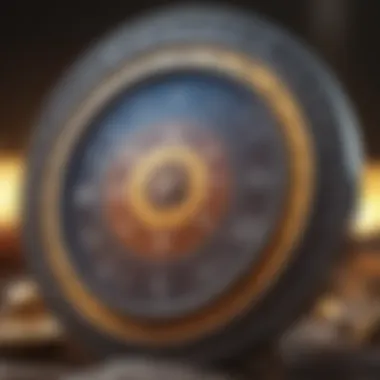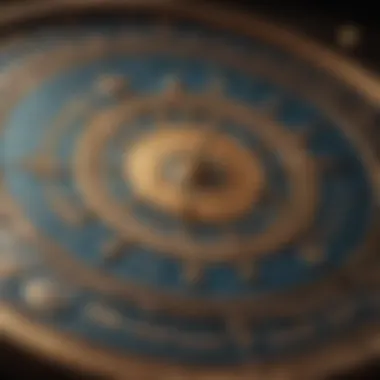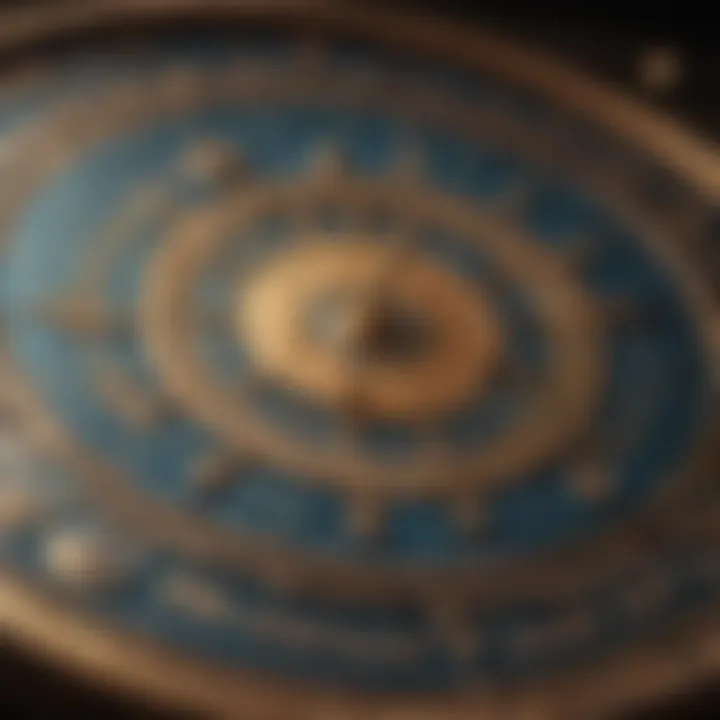Understanding Jyotish Astrology with Free Charts


Intro
Jyotish astrology, with its profound historical roots and complex systems, offers a unique perspective on personal and spiritual growth. By harnessing the insights provided by free charts, practitioners can benefit from a clearer understanding of their life's path. This guide aims to illuminate how these charts operate and their significance within the larger framework of Jyotish.
Astrological Concepts
Understanding the foundations of Jyotish astrology is essential for interpreting free charts effectively. Let's explore the key terms and the historical evolution of this ancient practice.
Definition of Key Terms
- Jyotish: Often referred to as Vedic astrology, it stems from ancient Indian texts known as the Vedas.
- Nakshatras: Lunar mansions crucial in determining the position of planets and their influences.
- Dasha: The planetary period system which helps interpret astrological predictions based on the timing of events.
Historical Background of Astrology
Astrology, in its various forms, has been integral to many cultures, but Jyotish is particularly significant in Indian tradition. It combines cosmic observation with the belief that celestial bodies profoundly impact life on Earth. The origins trace back thousands of years when early astronomers began interpreting celestial movements as divine guidance.
Overview of Different Astrology Branches
Jyotish astrology has distinguished itself alongside other branches including:
- Western Astrology: Centered on sun signs and horoscopes, often emphasizing personality traits.
- Chinese Astrology: Based on the lunar calendar, utilizes animals to represent years and characteristics.
Each branch possesses its unique methodology and focus, contributing to the rich tapestry of astrology as a whole.
Zodiac Signs Exploration
Each zodiac sign in Jyotish holds unique energies and interpretations. A deep dive into these signs unveils their significance within personal growth.
In-Depth Analysis of Each Sign
The zodiac comprises twelve signs, each associated with specific nakshatras and traits, affecting human behavior and life paths.
Personality Traits and Characteristics
For instance,
- Aries: Energetic and pioneering.
- Taurus: Stable and reliable.
- Gemini: Adaptable and communicative.
These traits guide individuals in understanding their innate strengths and challenges, fostering personal evolution.
Historical and Mythological Connections
Jyotish also intertwines with mythological narratives, such as tales surrounding planets like Jupiter and Venus that influence the signs, further deepening the richness of interpretation.
Celestial Events
Astrology does not operate in a vacuum. Major celestial events serve as significant markers, impacting astrological interpretations and personal growth journeys.
Major Cosmic Phenomena
Notable phenomena include:
- Solar and Lunar Eclipses: Often viewed as transformative moments.
- Retrogrades: Particularly Mercury retrograde, widely discussed for its perceived impacts on communication.
Impact of Celestial Events on Astrology
These events are key to chart interpretations, sometimes marking the beginning or ending of significant life cycles.
Rituals and Practices During Celestial Events
Engagement in rituals can enhance perception and clarity during such events. Practitioners might perform specific ceremonies to harness cosmic energies, facilitating deeper insights into personal charts.
_
Understanding Jyotish Astrology
Jyotish astrology, often referred to as Vedic astrology, holds a significant position in the realm of astrological practices. It provides insights into the energetic patterns of human existence, revealing the influence of celestial bodies on individual lives. By comprehending Jyotish, practitioners can gain a deeper understanding of personal tendencies, potentials, and challenges. This exploration into Jyotish is crucial because it emphasizes the interconnectedness of cosmic events with human experiences.
Historical Context of Jyotish
The roots of Jyotish astrology stretch back thousands of years, deeply intertwined with ancient Indian culture. The term 'Jyotish' itself translates to 'light' or 'divine light,' which signifies illuminating one's path through astrological guidance. Historical texts like the Vedas and the Upanishads underpin the principles of Jyotish, allowing it to thrive as a cornerstone of Indian philosophy and spirituality.


In its historical journey, practitioners of Jyotish have utilized it not just for individual insight but also for societal guidance, including the timing of events. Kings and scholars engaged in astrological consultations to ensure favorable conditions for pivotal moments. This historical significance underscores the weight that Jyotish continues to carry in contemporary times, allowing seekers to access wisdom from an ancient tradition.
Core Principles of Jyotish
The core principles of Jyotish revolve around a few fundamental concepts. At the heart is the belief that planets and stars exert influence on life. These influences shape one's character, decisions, and emotional states. Understanding these core principles can lead to self-awareness and personal growth. Some essential elements include:
- The Twelve Zodiac Signs: Each sign embodies distinct traits and characteristics, forming the foundation of astrological interpretation.
- The Nine Planets (Navagrahas): Jyotish recognizes the influence of these celestial bodies, each associated with specific qualities and life aspects.
- The Houses: There are twelve houses in Jyotish, representing various life areas, such as relationships, career, and health. Each house's condition influences personal experiences.
These principles collectively offer a complex yet coherent framework for interpreting life events and personal situations. Understanding Jyotish astrology thus serves not only to explain phenomena but also as a tool for forecasting and navigating life's challenges more effectively.
What is a Jyotish Free Chart?
Understanding what a Jyotish free chart is crucial for anyone interested in Jyotish astrology. It provides a framework for analyzing celestial positions at the time of one's birth. This chart serves as a guide for personal insights, predictions, and perspectives about different aspects of life. By using a free chart, individuals can avail themselves of astrological insights without needing to pay for professional services. This democratizes access to astrological knowledge and tools.
Definition and Purpose
A Jyotish free chart is an astrological chart that illustrates the positions of celestial bodies at the exact moment of an individual’s birth. It is a personalized map that can reveal a lot about one’s character, potential, and life path. The primary purpose of such a chart is to provide insights into a person's strengths and weaknesses, helping them navigate life with a better awareness of their inherent qualities.
This chart acts as a mirror reflecting the cosmic influences that shape personal experiences and decisions.
Components of a Jyotish Free Chart
The Jyotish free chart comprises several core components that play critical roles in astrological interpretation.
Ascendant
The Ascendant, or rising sign, is one of the most important aspects in a Jyotish free chart. It represents the sign that was rising on the eastern horizon at the time of birth. The Ascendant sets the stage for the rest of the chart, influencing how an individual presents themselves to the world.
It reflects an individual’s outward personality and can provide insight into their natural reactions to circumstances. The benefit of understanding one's Ascendant is significant; it helps to shape immediate perceptions and can guide individuals in their interactions with others. However, focusing solely on the Ascendant can sometimes overlook deeper traits revealed by the positions of planets and houses.
Planets and Their Positions
The planets and their specific positions are another key aspect of the Jyotish free chart. Each planet has distinctive characteristics that influence different facets of life. The positions of these planets can reveal critical insights into personality traits, challenges, and opportunities.
For example, the position of Venus can indicate relationship dynamics, while the position of Mars can showcase an individual's drive and ambition. The understanding of planets provides depth to interpretations, making the Jyotish chart a powerful tool for self-awareness. However, it can also become complex, as each planet's influence is affected by its location and aspects with other celestial bodies.
Houses
The houses in a Jyotish free chart represent different areas of life, such as career, relationships, and health. Each house is associated with specific themes and experiences. For instance, the fourth house is connected to home and family, while the tenth house relates to career and social standing.
Knowing which planets occupy certain houses gives further nuance to the individual’s experiences in those areas. This insight can be beneficial for making decisions and understanding life situations. However, house interpretations can vary based on the different houses’ positions and interactions, making it necessary for individuals to engage deeply with the overall analysis of the chart.
The Jyotish free chart is not just a collection of symbols; it's a unique representation of one's life journey, shaped by cosmic forces at the time of birth.
Understanding these components enables individuals to unlock the significant meaning behind their Jyotish free chart. This knowledge can enhance personal growth and provide clarity in navigating life's complexities.
How to Generate a Free Jyotish Chart
Generating a free Jyotish chart is crucial in understanding your astrological blueprint. The chart serves as a visual representation of the celestial bodies' positions at the exact moment of your birth. This visual map helps in interpreting various facets of life, including personal growth, relationships, and career choices. Understanding how to generate this chart will empower you to unlock the potential insights it offers. It is a starting point for deeper astrological analysis.
Required Information
To create an accurate Jyotish chart, specific information is necessary. The key pieces include birth date, birth time, and birth location. Each of these elements contributes distinctly to the chart’s accuracy and relevance.
Birth Date
The birth date is foundational in Jyotish astrology. It marks the astrological day of your existence and is essential for determining your sun sign, which plays a significant role in your personality traits and life path. Knowing your correct birth date is beneficial because it anchors other calculations.
A unique feature of the birth date is its universality; everyone has one. However, this can also lead to inaccuracies if the date falls near a cusp, where transitions between signs occur. In these cases, consulting a seasoned astrologer can clarify any confusions regarding sign placement.
Birth Time
Birth time is equally important, as it precisely captures the moment of your entrance into the world. This data determines the ascendant and the placement of planets in the houses—both critical for accurate interpretations. An exact time allows for a more nuanced reading of the chart, enhancing its predictive capabilities.
One key characteristic of birth time is its specificity. Birth times can often be more difficult to determine than birth dates, especially if records are unclear. This can create challenges in generating a complete chart, as any inaccuracies can skew results significantly.
Birth Location
The birth location impacts various astrological factors like house placements and planetary aspects. This geographical detail adjusts the calculation to reflect local celestial positions, making it essential for accuracy.
The distinctiveness of birth location lies in its influence on the chart's overall context. Different places can contribute to a diverse range of astrological effects. If ignored, the chart may not resonate with the individual's experiences significantly.


Using Online Tools
The rise of online technolgy has made generating a free Jyotish chart more accessible than ever. Various websites and software tools allow users to enter required information and receive their personalized charts instantly. These online platforms often provide additional features like automated interpretations, making it easier for both beginners and experienced astrologers to analyze their charts.
Despite the convenience of online tools, understanding how to interpret the data accurately remains vital. While these platforms can generate charts quickly, the depth of analysis often comes from a deeper study of the chart's nuances. By combining technology with knowledge, one can develop a more comprehensive understanding of their unique astrological narrative.
Interpreting the Jyotish Chart
Interpreting a Jyotish chart requires a nuanced understanding of its elements. Each chart is unique, representing not just the positions of celestial bodies at the time of one's birth, but also the energies and influences that these positions bring forth. In this section, we will explore the importance and benefits of interpreting a Jyotish chart and the considerations that come with it.
Understanding the Significance of Planets
The planets in a Jyotish chart signify various aspects of life. Each planet embodies specific qualities and governs different life areas. For example, Jupiter relates to knowledge and expansion, while Saturn often represents discipline and limitation. Understanding the placement of these planets in various houses can give clearer insights into an individual’s personality, challenges, and potential paths.
When interpreting the significance of planets, practitioners should pay attention to:
- Planetary positions: Where a planet resides in the chart affects its influence.
- Dasha periods: These are time frames that allow specific planets’ energies to manifest prominently.
- Relationships between planets: How planets interact can show tensions or harmonies within one's life.
For a more in-depth study of planetary significances, you can explore resources such as Wikipedia’s Jyotisha.
Role of Houses in Interpretation
In Jyotish astrology, houses serve as the framework for analyzing individual experiences and circumstances. Each house relates to different aspects of life, from finances and relationships to health and spirituality. The first house, for instance, signifies identity and self-image, while the seventh house deals with partnerships and marriages.
Key concepts to consider about houses include:
- House placements: Where planets land in these houses can modify their effects.
- House rulers: The ruling planets of each house can provide additional context for the energies at play.
- Empty houses: Even houses without planets can reveal significant information about the individual's life path, often depending on aspects from other planets.
Analyzing Aspects and Their Impact
Aspects are crucial in Jyotish interpretation. They describe the angles and relationships between planets, illustrating how planetary energies influence each other. Positive aspects may indicate support, while challenging aspects can signal struggles or opposition.
To effectively analyze aspects, consider:
- Types of aspects: Such as conjunctions, squares, trines, and oppositions, each with distinct meanings.
- Strength of aspects: The closer the aspect, the stronger its influence is likely to be felt.
- Navigating mixed signals: It is essential to weigh both harmonious and challenging aspects together for a balanced view.
The interpretation of these elements—planets, houses, and aspects—gives a comprehensive overview of the individual's life. It provides depth in understanding personal growth, challenges, and opportunities that may arise throughout their journey.
“In analyzing a Jyotish chart, one realizes the intricate web of influences guiding one's life, blending the cosmic with the personal.”
Applications of Jyotish Astrology
Jyotish astrology is more than just a system of predictions; it serves as a tool for insight across various aspects of life. Understanding its applications can enhance personal awareness and facilitate more informed decisions. This section explores three critical areas where Jyotish can significantly impact individuals: personal growth, relationship dynamics, and career decisions.
Personal Growth and Self-Discovery
Jyotish astrology aids in personal growth by helping individuals understand their true selves. The analysis of one's free chart reveals strengths, weaknesses, and innate tendencies. It may highlight key personality traits based on planetary positions and their alignments. By recognizing these aspects, a person can focus on their strengths while also working on areas needing improvement.
Additionally, it encourages a transformative journey towards self-discovery. For example, someone may discover through their chart that they have a strong Mercury influence, suggesting a talent for communication. This understanding can help them choose careers or hobbies aligned with their skills, such as writing or teaching. Revealing insights from a Jyotish chart can lead an individal to embrace their authentic selves fully.
Relationship Dynamics and Compatibility
Jyotish also plays a significant role in relationship dynamics. By comparing two individuals' charts, an astrologer can assess compatibility. This comparison involves analyzing planetary placements, house positions, and aspects that indicate harmony or potential issues. For instance, a strong connection between Venus and Mars in both charts may signify incredible attraction.
Understanding relationship dynamics through Jyotish can lead to healthier interpersonal connections. Partners can gain insight into their communication styles and emotional responses. With this knowledge, they can approach conflicts with more empathy and understanding, improving overall relationship quality. Such insights help individuals navigate their interactions more wisely and intuitively.
Career and Financial Decisions
When considering career paths or financial investments, Jyotish astrology offers a unique perspective. It can guide individuals in identifying which professional environments align best with their astrological profiles. For example, if their chart shows a strong influence from Saturn, they might excel in structured professions like finance or law. Conversely, a predominance of Jupiter could indicate success in creative fields or education.
Moreover, Jyotish can assist in timing significant career moves or financial ventures. Astrologers can analyze transits and periods of influence that are more conducive for starting new projects or investments. This guidance can minimize risks and enhance the likelihood of success.
"Jyotish astrology provides insights that can influence critical life decisions, allowing for a more nuanced understanding of personal and professional paths."
In summary, the applications of Jyotish astrology are multifaceted. It contributes to personal growth, enhances relationship understanding, and supports career choices. By embracing these insights from free charts, individuals can navigate their lives with greater awareness and intention.
Limitations of Jyotish Astrology
Jyotish astrology, while insightful, has its limitations. Understanding these constraints is essential for anyone engaging with this ancient system. Acknowledging shortcomings does not diminish its value; instead, it helps practitioners approach findings with a prudent mindset.
Common Misconceptions


One prevalent misconception is that Jyotish astrology delivers absolute predictions. Many believe that a well-calibrated chart will provide an unerring forecast of their lives. In reality, Jyotish serves as a tool for guidance rather than an infallible source of truth. The intricate interplay of celestial bodies is complex, and the future is affected by myriad factors, including personal choices and external circumstances.
Additionally, some view Jyotish solely as a deterministic framework. This misunderstanding overlooks the emphasis placed on free will and individual agency within the practice. Choices made in life can profoundly shape one’s path, often mitigating or enhancing astrological influences.
Furthermore, the belief that all horoscopes can be interpreted in the same manner is misleading. Each chart is unique, shaped by individual birth data, yet many attempt to apply generic interpretations across diverse charts. This can lead to misguided conclusions and erroneous decisions.
Scope of Predictions
The predictive scope of Jyotish astrology is another area of limited understanding. Although it offers insight into possible trends and influences, the predictions should not be taken as absolute certainties. Jyotish can indicate potential challenges or opportunities, but it does not dictate outcomes.
In fact, the efficacy of predictions often depends on the practitioner's competence. A skilled astrologer can discern subtleties and nuances within a chart. Conversely, novice interpretations can lead to misinterpretations.
Moreover, certain areas of life may be more suitable for astrological inquiry than others. For example, Jyotish can provide valuable perspectives on personal growth and relationship dynamics but may not have the same clarity concerning financial markets or political events. Understanding these limitations is crucial for effective application of the insights gained.
Key takeaway: Jyotish astrology offers potent insights but should be approached with an understanding of its limitations. Familiarizing oneself with misconceptions and the scope of predictions enhances the practice and enriches the experience.
Comparing Jyotish with Western Astrology
Understanding the contrasts between Jyotish and Western astrology is essential for anyone trying to explore the depths of either system. Both methods share the same foundation, yet they approach astrology from different vantage points, yielding unique interpretations and insights. This comparison not only enhances our knowledge of astrological practices but also facilitates a greater appreciation for diverse cultural perspectives.
Fundamental Differences
At the heart of the differences between Jyotish and Western astrology lie their core philosophies and methodologies. Jyotish, often referred to as Vedic astrology, places disproportionate emphasis on the moon's position. This lunar influence leads to a focus on the individual's emotional and psychological state, highlighting the importance of mental well-being.
In contrast, Western astrology leans towards a solar perspective, often centering on the sun sign and its characteristics. This approach tends to concentrate on personality traits and external behaviors.
Here are some key distinctions between the two systems:
- Zodiac System: Jyotish uses the sidereal zodiac, which is aligned with the stars, while Western astrology utilizes the tropical zodiac, which is aligned with the seasons.
- Chart Calculations: Jyotish calculations often involve a more complex system of chart integration, sometimes considering a broader array of celestial bodies. Western astrology usually simplifies this by focusing mainly on the planets and their aspects.
- Predictive Techniques: Jyotish relies heavily on dashas or planetary periods, which offer a framework for understanding timing in life events. Western astrology, in contrast, often employs transits and progressions to predict changes and developments in an individual’s life.
Integration of Both Systems
While Jyotish and Western astrology showcase fundamental differences, they can also complement each other. The fusion of these systems can enrich an astrologer's toolkit, providing broader insight into an individual's life journey. Acknowledging both perspectives allows practitioners to draw on diverse techniques and interpretative styles.
Consider these approaches to integrating the two systems:
- Holistic Analysis: Using both Jyotish and Western charts concurrently can yield a more comprehensive understanding of a person’s astrological make-up. This kind of analysis can unveil contradictions and harmonies in a chart, leading to profound insights.
- Insights into Timing: Combining the predictive techniques of Jyotish with the transitory methods of Western astrology enables more precise timing for actions and decisions.
- Personal Growth: By integrating both systems, individuals may find that understanding their astrological influences on different levels can empower personal development and self-awareness.
The study of astrology is much more than predicting the future. It can serve as a mirror reflecting our psyche.
Future of Jyotish Astrology
Jyotish astrology stands at a unique intersection of tradition and innovation. As we look ahead, it is clear that this ancient practice can evolve to meet modern needs. The future of Jyotish significantly depends on embracing technological advancements while maintaining its core principles. It presents potential benefits that could enhance its visibility, accessibility, and relevance in an increasingly digital world. Considerations surrounding evolving cultural contexts also play a critical role in shaping its future.
Technological Advancements
Technology has transformed various fields, and Iyotish astrology is no exception. Digital platforms for generating free charts have surged in popularity. They enable users to quickly access personalized charts without needing extensive astrological knowledge. This democratization of information empowers a broader audience to delve into their astrology.
Additionally, mobile applications for Jyotish are becoming common. They allow users to consult their charts and receive insights on the go. These apps often incorporate features like notifications for auspicious timings and daily horoscopes, making astrology more accessible. Moreover, the integration of artificial intelligence could mean more personalized interpretations, enhancing user engagement.
The rapid adoption of technology is reshaping Jyotish astrology, making it more accessible to a global audience.
Cultural Relevance
As societies evolve, so do their spiritual and philosophical beliefs. Jyotish astrology needs to adapt to various cultural contexts while respecting its roots. In recent years, there has been a resurgence of interest in esoteric practices. This trend reflects a desire for deeper self-understanding and exploration of life's mysteries. Jyotish can find relevance by addressing contemporary concerns, such as mental health and personal growth.
Furthermore, as more individuals seek holistic approaches to life, the principles of Jyotish can play a vital role. The focus on planetary influences can provide insight into personal challenges. This understanding can aid in decision-making and encourage self-discovery in a complex world. Cultural relevance also extends to education. Including Jyotish in academic settings can introduce a new generation to its intricacies and timeless wisdom.
Culmination
The conclusion of this article emphasizes the vital aspects of Jyotish astrology as explored through free charts. Understanding Jyotish offers both an introspective journey and an avenue for practical application in daily life. A thorough grasp of the concepts discussed enables individuals to better navigate their personal and spiritual pathways.
Summarizing Insights
In this article, we have delved into the essence of Jyotish astrology, focusing on the key elements that define its practice. It began with an examination of the historical context of Jyotish, setting a foundation for its principles. We discussed free charts, outlining their importance and the core components that make them instrumental for users.
The process of generating free Jyotish charts was clearly laid out, enabling anyone interested in astrology to create their own chart without barriers. By interpreting the key components of a Jyotish chart, such as planets, houses, and aspects, users can glean insights regarding their life's trajectory and personality traits.
The applications of Jyotish go beyond mere predictions. They extend into the realms of personal growth, relationship compatibility, and career decisions. However, it’s essential to acknowledge the limitations of this ancient system, addressing misconceptions and recognizing the scope of what predictions can entail.
Finally, we compared Jyotish with Western astrology, providing a broader context about how these systems can coexist and complement one another amid technological advancements and cultural shifts.
Encouraging a Deeper Exploration
Encouragement for further study is essential. Jyotish astrology is profound, and while this article serves as a comprehensive introduction, there is much more to explore. Engaging with reputable texts and resources will deepen understanding—books by renowned authors like David Frawley or online platforms that offer courses can greatly enrich knowledge.
Additionally, practical experience reinforces learning. Observing one’s chart and those of close friends or family can lead to significant insights. Self-reflection through the lens of Jyotish encourages personal growth and deepens awareness of one's path and choices.







